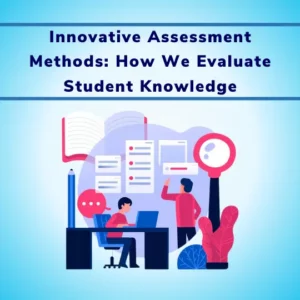Article Contents
Introduction
The term “AI” is no longer a futuristic concept; we are already living in an AI-dominated era. Organizations worldwide are racing to integrate artificial intelligence (AI) into their operations, aiming to secure a competitive edge in their respective industries.
This race includes not just tech giants and corporate behemoths but spans across sectors, including education.
Despite the enthusiasm, integrating AI comes with its own set of challenges. Many organizations, including educational institutions, grapple with a lack of clear AI vision and an insufficient workforce skilled in AI technologies.
These hurdles underscore the critical need for a strategic approach to AI adoption, emphasizing the importance of clear objectives and dedicated skill development.
Educational institutions stand at the crossroads, pondering over questions that could shape their future. How can AI catalyze educational advancement? Identifying impactful AI use cases, leveraging AI for a competitive advantage, enhancing student experiences, and refining the teaching-learning process are at the forefront of this exploration.
A Glimpse into the Future of AI
Imagine stepping into a classroom where every student is engaged, not just with books, but with interactive AI tools that guide their learning journey. In this room, a group of students gathers around a smart board, collaborating on a complex problem with insights from an AI assistant.
Elsewhere, a robot gently corrects a student’s science experiment technique. This isn’t a scene from a sci-fi movie; it’s the future of education, and it’s closer than you think.
No one imagined the power of AI until we saw the first version of OpenAI launch in November 2022. In the last 12 to 15 months, there have been many AI-driven applications and solutions coming up. The pace of it is just phenomenal.
The AI Revolution in Education
Artificial intelligence (AI) has permeated every aspect of our lives, and education is no exception. From administrative operations to classroom learning, AI’s potential to transform the educational landscape is immense.
Institutions are adopting AI-driven tools like customer relationship management (CRM) systems, ERP (enterprise resource planning), and examination management software to streamline operations and enhance learning experiences.
The integration of AI doesn’t stop here; it extends to personalized learning, automated grading, and even student support through AI-driven grievance-handling systems.
The Need for Leadership in AI Integration
As educational institutions navigate the complex world of AI adoption, the need for specialized leadership is clear. Corporations have long recognized the importance of roles such as Chief Information Officer (CIO) or Chief Technology Officer (CTO) to steer technology strategies. Similarly, educational institutions require a dedicated Chief AI Officer (CAIO) or an AI consultant.
AI-powered personalized learning has been shown to increase student engagement by 47% and reduce course dropout rates by 32%.
This role is crucial for exploring AI tools, identifying relevant use cases, prototyping, and ultimately integrating AI technologies to revolutionize educational practices. The CAIO is the visionary who can craft a long-term AI roadmap, ensuring institutions remain competitive and innovative.
A study by the International Society for Technology in Education (ISTE) suggested that while educators are increasingly interested in AI, many lack the necessary resources and expertise to integrate AI technologies effectively into their curriculum.
This gap highlights the critical role a CAIO could play in bridging these divides.
Role of Chief AI Officer (CAIO) for Education:
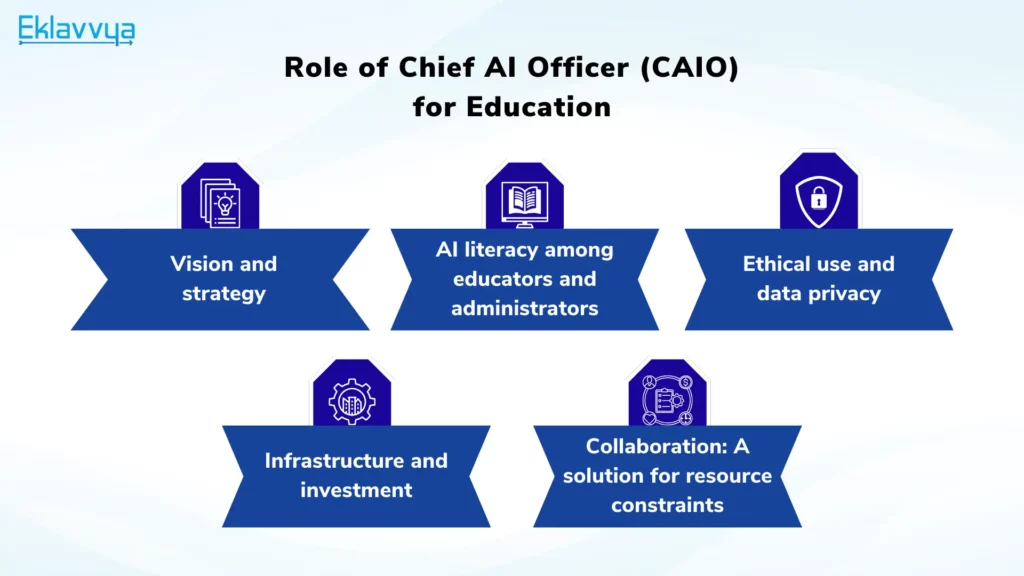
Vision and Strategy Development
A CAIO can spearhead the development of a comprehensive AI strategy that aligns with educational goals. This involves identifying opportunities for AI integration that can enhance learning outcomes, streamline administrative processes, and create personalized learning experiences.
AI Literacy Among Educators and Administrators
A significant challenge in adopting AI in education is the varying levels of AI literacy among educators and administrators. The CAIO can lead initiatives to improve AI literacy, ensuring that staff can effectively utilize AI tools. For instance, as of my last update, less than 20% of educators felt confident in their ability to use AI technologies in teaching, indicating a substantial opportunity for professional development.
Ethical Use and Data Privacy
The CAIO is crucial in ensuring the ethical use of AI and addressing concerns around data privacy, bias, and equity. Establishing guidelines and best practices for AI use can help mitigate risks and promote trust among stakeholders.
One crucial aspect of adopting AI for enhanced learning outcomes is the significance of security.
Student privacy and data security must be considered when devising strategies to protect their information in this AI-driven world.
When implementing any AI-centric automation solution, it is vital to ensure that private data relating to students, teachers, or educators remains safeguarded and not leaked by any means.
Infrastructure and Investment
For AI initiatives to be successful, appropriate infrastructure and investment are necessary. A CAIO can advocate for and manage the allocation of resources to build and maintain the technological infrastructure needed for AI integration. For example, investment in AI in education is expected to grow significantly, with estimates suggesting it could reach several billion dollars globally by 2025.
Collaboration: A Solution for Resource Constraints
For institutions where appointing a dedicated AI expert is not feasible, collaboration offers a viable alternative.
Partnerships with technology companies specializing in AI and education can bridge the gap. These collaborations bring expertise and resources, allowing institutions to adopt AI without the overhead of an in-house specialist.
The market for AI in education was valued at $1.82 billion in 2021 and is projected to grow at a CAGR of 36.0% from 2022 to 2030.
Why Act Now?
The education sector stands on the brink of an AI revolution. Institutions that proactively adopt AI will leapfrog into the future, reaping benefits such as scalability, cost savings, and enhanced efficiency. The time to act is now; waiting too long may leave institutions playing catch-up in an increasingly competitive landscape.
Machine learning, a subset of AI, accounted for the largest revenue share in the AI education market due to its application in virtual support and reading knowledge in digital formats.
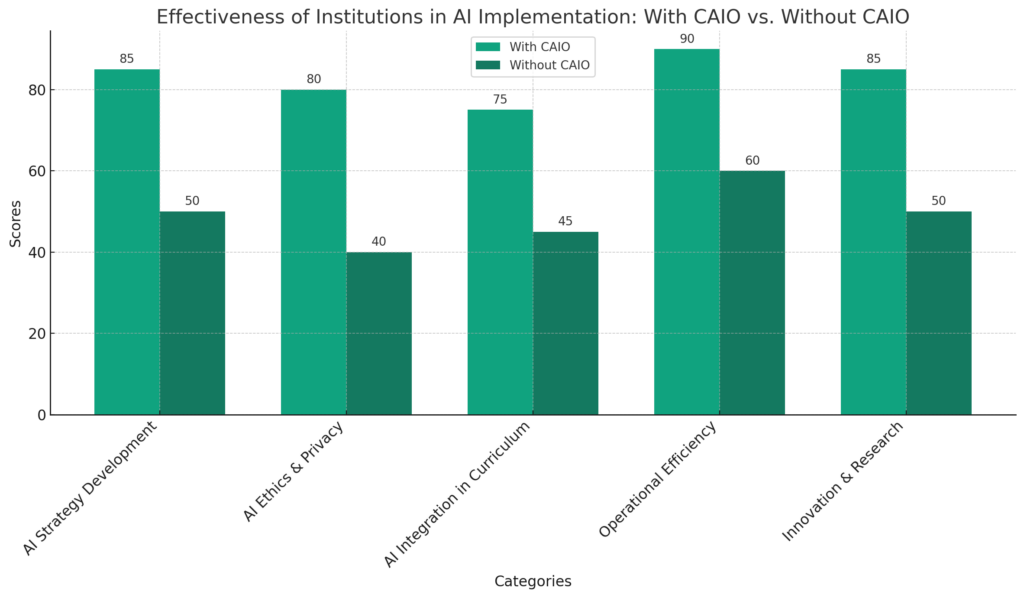
Studies have shown that AI implementation effectiveness increases with the involvement of the Chief AI officer Kind of Roles in the organization
Role of AI in various operations of Education
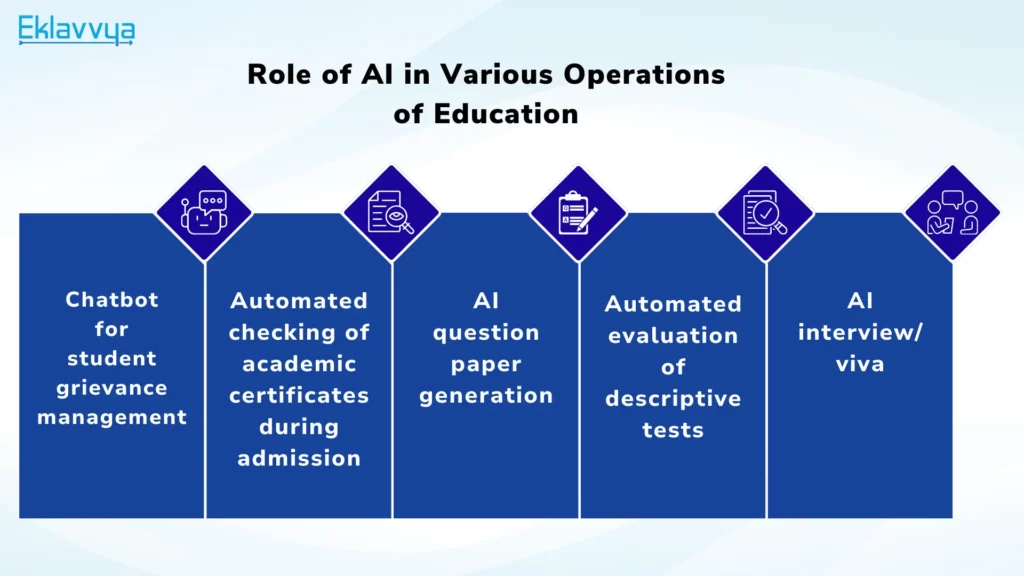
1. Chatbot for Student Grievance Management
Let us delve into intriguing use cases related to the adoption of AI in education. One such use case is employing chatbots for student grievance management. Educational institutions typically manage hundreds or even thousands of students, who must attend various courses and exams. These students may have questions about fee payments, examination schedules, or other matters.
An AI-driven chatbot can be employed to address student grievances effectively. Several impressive AI chatbot tools can be easily integrated into existing systems. When students submit their queries, the chatbot learns the rules and regulations associated with the institution. Input files concerning exam schedules and other details are provided, enabling the chatbot to respond to and resolve student inquiries.
This not only alleviates student anxiety related to their concerns but also reduces the burden on educational institutions by decreasing the need for support personnel to resolve various student grievances. In addition, AI can assist in addressing frequently asked questions from students, acting as a reliable expert capable of handling grievances efficiently.
2. Automated Checking of Academic Certificates During Admission
The evaluation of academic certificates is a crucial step in the admissions process for any educational institution. Many prominent institutes receive thousands of applications, each accompanied by a variety of documents such as academic certificates, category certificates, residency proofs, mark sheets, and other credentials.
These documents must be manually assessed for authenticity and to ensure that the student has met the eligibility criteria for admission. If any discrepancies are found, the applicant may be denied entry.
This manual evaluation process is time-consuming and labour-intensive. However, artificial intelligence (AI) offers a potential solution for automating the verification of these documents. Instead of taking weeks and countless man-hours to sift through thousands of submissions, AI technology can complete the task in mere minutes.
Adopting AI for automated checking of academic certificates during admission cycles can save both time and resources, making it an attractive option for educational institutions.

3. AI Question Paper Generation
The adoption of AI in question paper generation has become increasingly relevant in the realm of academia. Students must navigate a myriad of exams throughout their educational journey, including internal tutorials, quizzes, vivas, academic semester exams, interim exams, and final exams.
Crafting these question papers according to the syllabus and evaluation criteria is an arduous task for examiners, often involving considerable manual labour.
Moreover, question papers come in various formats, such as case studies, multiple choice questions, descriptive questions, and case study-oriented questions. This further complicates the process of compiling question papers that adhere to difficulty-level criteria.
Enter AI tools: these innovative solutions can streamline the question paper generation process by automating it according to specific requirements. By providing inputs to the AI tool regarding syllabus and difficulty level, examiners can generate question papers tailored to their needs.
Although subject matter experts may still need to review or verify the generated papers, AI tools can significantly reduce the man-hours spent on this time-consuming task.
AI-assisted question paper generation presents a promising solution for educators seeking to optimize their examination processes and better utilize their valuable time.

4. Automated Evaluation of Descriptive Tests
One intriguing area where AI can be employed is in the evaluation of descriptive answers. Picture this: during an exam, students often write or type lengthy responses that are not only difficult to read but also make the examiner’s job rather dull and monotonous.
Furthermore, the evaluation process for such answers is often riddled with bias. Examiners may favour certain handwriting styles, contexts, or writing techniques, leading to inaccurate assessments.
Enter AI tools, which have the potential to automate and streamline the evaluation of subjective tests. When used in online exams, these tools can automatically assess students typed descriptive answers.
AI considers model responses and previously evaluated answers by examiners to develop a unique pattern and marking scheme. By applying this scheme, AI can evaluate answers with impressive accuracy and save hundreds or even thousands of man-hours.
Imagine a scenario where thousands of students take an exam, and their descriptive answers need evaluation. Traditionally, this process would take multiple weeks or even months to complete. However, with AI’s assistance, evaluations can be finished in mere hours. This not only saves valuable time but also ensures that results are delivered promptly and accurately.

5. AI Interview/ Viva
Examiners are essential for conducting viva exams, as they listen to students’ responses and assign marks. However, AI interviewers can now automate the process of oral examinations for educational institutions. By considering the student’s answers, the AI tool poses subsequent questions, requiring a response.
Upon completion of the interaction, the AI system evaluates the overall context and assigns a unique rating to each student. This automation allows thousands of students to concurrently participate in viva exams without human examiners listening to their answers. Additionally, the AI tool records all student responses for future reference.
Undoubtedly, AI presents intriguing use cases for streamlining interview processes and oral examinations within educational institutions.

Conclusion
AI’s role in education is not just inevitable; it’s essential. Whether through the leadership of a Chief AI Officer or strategic partnerships, institutions must embrace AI to enhance learning experiences, streamline operations, and prepare students for a technology-driven future.
The integration of AI in education is a journey, but with the right leadership and vision, it’s a journey that will lead to unparalleled innovation and success.


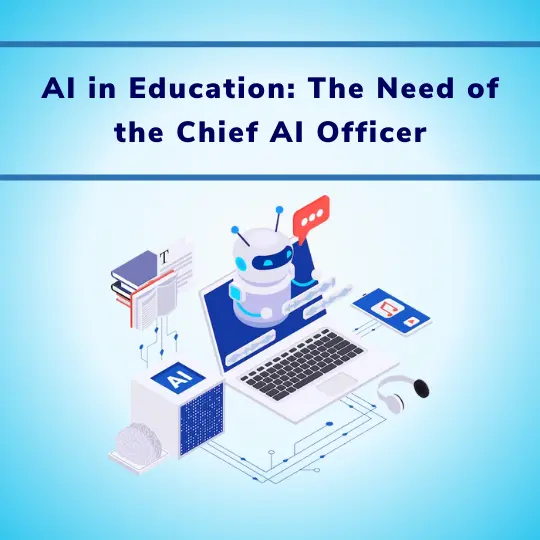
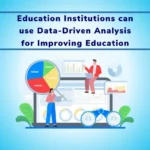
![How Government-Led Exams at 250+ Locations Are Setting New Standards of Integrity [Case Study]](https://www.eklavvya.com/blog/wp-content/uploads/2024/04/Enhancing-Exam-Integrity-Government-Certification-in-250-Locations-150x150.webp)
![Transforming Central Govt. Exams Evaluation: How Onscreen Marking is Leading the Charge [Case Study]](https://www.eklavvya.com/blog/wp-content/uploads/2024/04/How-Onscreen-Marking-Revolutionized-Central-Govt-Exams-Case-Study-1-150x150.webp)
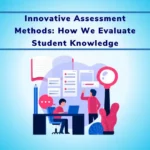
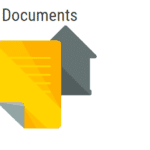

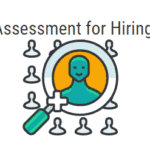









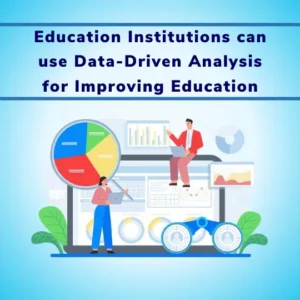

![How Onscreen Marking Revolutionized Central Govt Exams [Case Study]](https://www.eklavvya.com/blog/wp-content/uploads/2024/04/How-Onscreen-Marking-Revolutionized-Central-Govt-Exams-Case-Study-1-300x300.webp)
